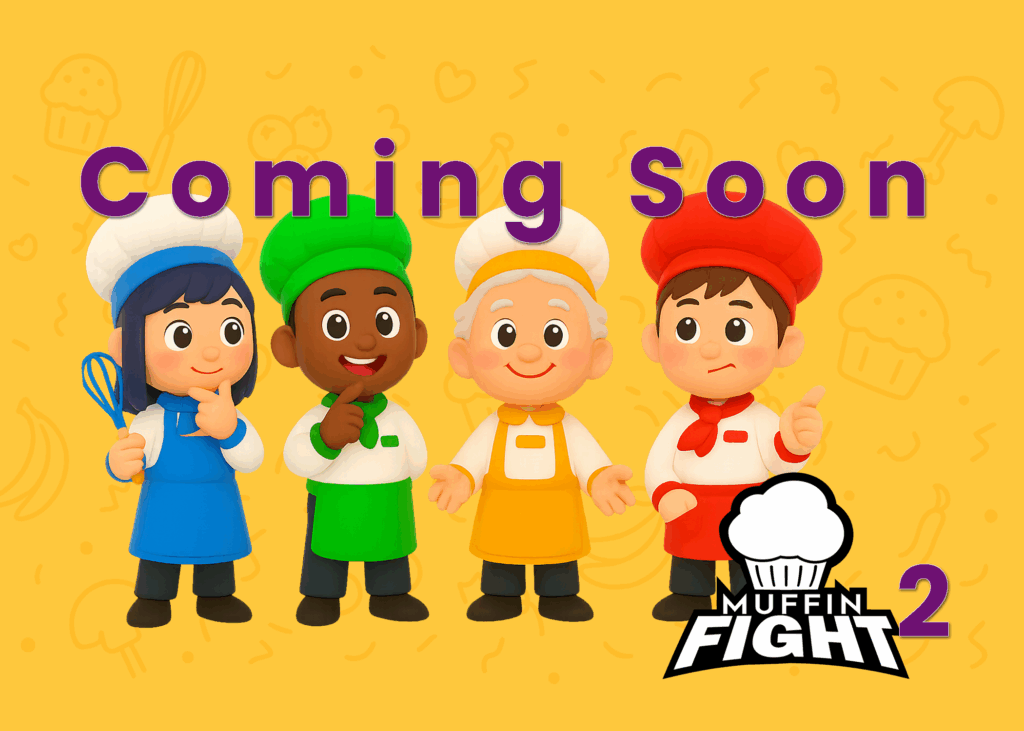
After nearly ten years of building games, we’re evolving Muffin Fight into something new: a VR game focused on learning through play. Muffin Fight 2.0 helps kids build real-world social-emotional skills while having fun. It turns screen time into connection time. This direction grew out of our work in the Platform Calgary Incubator. There, we refined our focus on using games as tools for growth, not just entertainment.
It’s been a hot minute since my last blog post. At that time, I discussed our pivot from custom development to product development. We were focusing on our mini-verses (AKA “The Verses”) concept and our development plan for MRDRBRS (our toyetic, slightly chaotic battle-bear game).
Since April, our team has been part of the Platform Calgary Incubator. This program is designed to help startups sharpen focus, validate audiences, and grow with intention. For us, that meant stepping back and asking: after nearly ten years of building games, what exactly do we want to carry forward?
When we looked at our body of work, three core product lines emerged:
- NeuroRecoVR, our stroke recovery platform, now thriving with a life of its own.
- MRDRBRS, a fast-paced arena game built for chaotic play.
- Muffin Fight, the quirky VR party game that, against all odds, revealed something much bigger.
What became clear is that Muffin Fight is the realization of our MiniVerses vision. We had imagined “the Verses” as learning social spaces. In practice, Muffin Fight became that. Evolving from its original “gather, bake, throw” concept, the 2023 re-release centered on social interaction and shared play. Muffin Fight 2.0 builds on that momentum, expanding scope while staying rooted in the playful chaos that made people love it.
Quick Backstory on Muffin Fight
We first built Muffin Fight in 2021 as a playful VR experience. It was simple: gather ingredients, bake muffins, and throw them at your friends. Lighthearted, silly, and fun.
But when we took Muffin Fight on the road, showcasing it at conferences and events throughout 2022 and 2023, we noticed something surprising.
- People loved watching people play. VR is rumored to be isolating, but Muffin Fight drew a crowd. Parents, teachers, and kids laughed together as they watched someone struggle (and succeed) in baking chaos.
- Children 9–14 lit up. While all ages tried it, this group leaned in hardest. They weren’t just entertained, they were engaged. They collaborated, they teased, they celebrated each other.
Education Has Always Been Part of our Story
Our studio’s history has always blended entertainment and education. For example, we’ve worked in healthcare training, in post-secondary edtech, and with partners like NorQuest College on inclusive, accessible learning products.
In addition, I’ve studied emotional intelligence and cross-cultural communication — skills that go far beyond classrooms. These include resilience, empathy, cooperation, and creativity. Altogether, they are the skills that every new generation needs to navigate a fast-changing world.
Growing up, most of us learned social skills on the playground, at recess and in gym class. That’s where you figured out how to wait your turn, negotiate rules, and bounce back from losing. Today, however, what’s changed is that the internet isn’t something kids join anymore — it’s the environment they’re raised in.
As a result, despite parents’ best efforts and interventions, the internet has become its own kind of playground — one without teachers or parents watching. And like Lord of the Flies, kids are left to sort out social rules, power dynamics, and belonging in spaces that can feel chaotic, unkind, or even unsafe.
This is why the future of Muffin Fight matters to us. It’s not just a game. Instead, it’s a chance to give kids back a space where play builds healthy social skills — laughter, cooperation, resilience — instead of leaving them to figure it out alone online.
Enter Muffin Fight 2.0
Now, with support from Platform Calgary, we’re building Muffin Fight 2.0. This new chapter focuses on one core idea: real-world skills through play.
Here’s what that means:
- Intentional screen use. Instead of passive scrolling, Muffin Fight invites kids into a shared, active play space.
- Play disguised as learning. Instead of kids rolling their eyes at “learning tools,” Muffin Fight delivers fun first, with social-emotional growth baked right into the chaos.
- Parent partnership. We want to talk to parents like you, even if you don’t have VR at home. We want to understand your screen time pain points, because the challenges of connection and emotional intelligence go far beyond devices. Interested in participating? Fill out our questionnaire.
We’re focusing on ages 9–14 who currently play VR — a group old enough to crave independence, but still forming the emotional intelligence that will carry them forward.
From Chaos to Connection
This blog kicks off our series, “From Chaos to Connection.” Over the next couple weeks, we’ll dive deeper:
- Part 2: Why emotional intelligence is the real back-to-school superpower — and how games are becoming the new lab for it.
- Part 3: Our manifesto: why play isn’t just downtime, but the secret builder of real-world skills.
Because after ten years of building games, one thing is clearer than ever: play isn’t an escape — it’s how we learn best.

